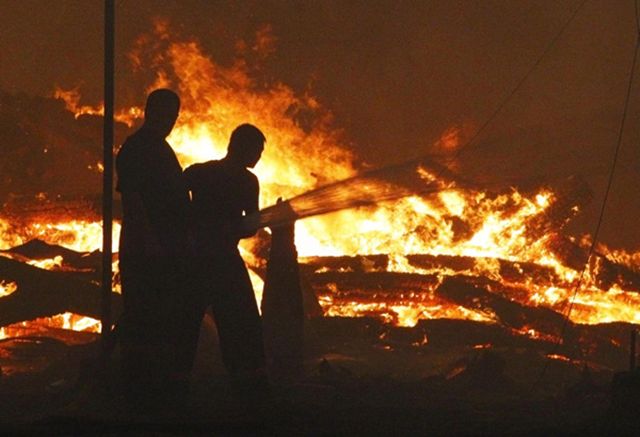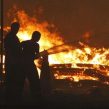
Hot Summer in Moscow Emerges as a Political Problem
Publication: Eurasia Daily Monitor Volume: 7 Issue: 148
By:

For weeks, the main news in Russia has been the weather –this summer has set many new heat records– but since last Friday, forest fires have become its new focus. Russian President, Dmitry Medvedev, held a special council on this issue, and Prime Minister, Vladimir Putin, made an emergency trip to Nizhny Novgorod oblast and visited a village that had been completely burned down (Kommersant, July 31). There is nothing surprising in the propensity of extra-dry forests to catch fire, and in Moscow, the smog from the smoldering peat-bogs has thickened since mid-July. The authorities, however, focused mostly on the damage to agriculture, which could suffer more from bureaucratic attention than from the dry spell (www.gazeta.ru, July 16). The spread of dozens of fire-storms was impossible to ignore after dacha-villages outside Moscow, such as Kupavna, started to burn (Moskovsky Komsomolets, July 31). TV channels started to open their news-bulletins with inferno images and supplying progressively gloomier statistics about the dozens of victims and thousands of destroyed houses.
Many media accounts show that the people in the risk-zones are very angry –and not at the weather, but with the belated and ineffectual help they received from the authorities. Responding to this discontent, Putin instructed all heads of municipalities who lost public confidence to tender their resignation, but it is clear that the responsibility for the poor preparation lies not with low-level officials (RIA Novosti, Vedomosti, July 30). The whole bureaucratic system operates in such a way that undesirable problems are filtered out, so the governors report to Moscow that everything is under control –until it is too late. The competence of every bureaucrat is judged by his ability to present good news and to demonstrate loyalty to the boss.
Medvedev encountered this “be-positive” style yet again during a meeting on the implementation of “national projects” and suddenly became irritated (Vremya Novostei, June 30). He obviously sought to harvest some PR-dividends from presiding over the discussion of such sensitive issues as healthcare and housing, but the proceedings were so excruciatingly boring that he wrote in his Twitter-blog: “Anybody who had the patience to follow the meeting on TV can draw the conclusion. The problems are very important but it is impossible to bear” (the record is absent in the English version of the blog). He tried to cut short the ministers and define the problems, but his own opening remarks were exactly of the same bureau-speak character (Kommersant, July 30). The Twitter-notes like “All governors should do everything they can to contain the forest fires” (July 30), were hardly very convincing.
Putin has mastered the art of directing the bureaucracy to perfection, but he also aspires to the role of “father-of-the-nation,” which requires stepping out of his air-conditioned cocoon and visiting disaster sites, like the Sayano-Shushenskaya hydro-power station, or the night-club in Perm, or indeed the charred remains of the Verhnaya Vereya village. Such images are distinctly negative, and Putin seeks to neutralize this impression by his generosity in distributing emergency funds. Finance Minister, Aleksei Kudrin, has conservatively estimated the damage at 5 billion rubles ($200 million), but the promises to build new houses before winter cannot convince millions of Russians who empathize with the angry villagers and look anxiously at the distant smoke (www.newsru.com, July 31).
The fact that the fires are still not under control translates into the impression that even Putin cannot make the top bureaucrats feel concerned, and work in the interests of the common people. The political elite live lives where money is their main preoccupation, traffic is not a problem because the sirens of escort cars avoid it, and smoke does not penetrate into mansions equipped with climate control. This arrogance of self-serving bureaucracy creates a vast pool of discontent, which feeds a variety of protest movements, some of which are mostly of a virtual character, like the campaign for saving Lake Baikal, which was sold by Putin (www.savebaikal.ru). Others are more physical, and the protests against the destruction of the Khimki forest, north of Moscow, took a violent form as the local administration was attacked (Novaya Gazeta, July 30).
According to an opinion poll, as much as 85 percent of Russians think that the authorities should listen to the protesters, while only 29 percent believe that they actually do so (www.levada.ru, June 28). One particular type of protest that generates high resonance is the rally in support of freedom of assembly, granted by Article 31 of the Constitution, that gathers on the Triumphalnaya square in Moscow on the last day of every second month. Last Saturday, it was again dispersed by the use of overwhelming police force (www.gazeta.ru, July 31; RIA Novosti, August 1). Deeply disappointed in the fruitlessness of her work, Ella Pamfilova, resigned on the eve of this action from her post as chair of the Presidential Council for Civil Society Institution and Human Rights (Moskovsky Komsomolets, July 31).
Many people who are trying to make a difference, and experts who examine the transfiguration of the post-crisis recovery into a pre-crisis bubble, are frustrated by the lack of real content in the declarations about “modernization” that are replayed from the top of the bureaucratic pyramid (Vedomosti, July 27). Simulation of attention and imitation of decision-making cannot make real problems evaporate, and the televised telephone conversation between Medvedev in the Kremlin and Putin in the still-green forest cannot extinguish the raging fires, as perfectly scripted as it was (RIA Novosti, July 30).
Medvedev may feel dissatisfied with the proliferation of words at the “working meetings,” but he has to admit that he has established this “format,” which produces primarily a TV-picture of loyal subordinates taking to heart the words of wisdom from the boss. It was rather odd that he mentioned “other formats,” where it is possible to discuss the political situation and even “political persecution, if it indeed happens.” His problem is that the people who perceive the need for such discussions, and indeed those who are persecuted, see little sense in discussing it with him.




